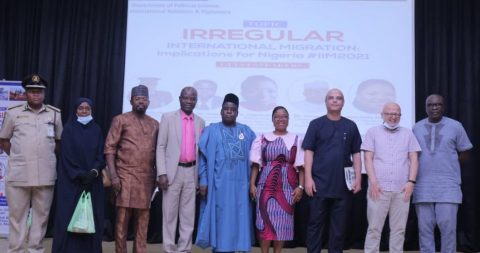Experts Brainstorm On Repercussions Of Irregular Migration For Nigeria
Latest Headlines, News Across Nigeria Thursday, December 16th, 2021
(AFRICAN EXAMINER) – Experts, stakeholders and representatives from agencies dealing with migration and other related issues converged at the auditorium of Nile University of Nigeria penultimate Tuesday to brainstorm on the implications of irregular migration for Nigeria and the way forward.
Irregular migration and human trafficking has remained a global scourge, with Nigeria acting a source, destination and transit country. According to the European Union (EU), one in every 10 illegal immigrants who entered Europe from 2015 to 2016 was a Nigerian.
The conference with the theme, “Irregular Migration: Implications for Nigeria”, was convened by a PhD Candidate, Susan Doofan Albert-Makyur and facilitated by the Department of Political Science and International Relations of the Abuja-based private multidisciplinary university, a member of the Honoris United Universities.
Irregular migration poses multiple challenges to countries of origin, transit and destination, as well as to migrants themselves. Migrants in irregular situation are particularly vulnerable to discrimination, exploitation and abuse.
Secretary of the Nigerians in Diaspora Commission (NiDCOM), Dr. Sule Yakubu Bassi said Nigerians continue to travel at their own risk and go through traumatic experiences such as exploitation by people smugglers, violence and exploitation of women, physical abuse, torture, rape, enslavement and other forms of psychological abuse.
“Often, women are promised regular/legitimate jobs, but when they arrive at their destination country they are forced into prostitution, giving the country a bad name internationally”, he said.
Dr. Bassi noted irregular migration is majorly driven by Push Factors, which include conflicts, political, economic, environmental, population explosion, health, etc and the Pull Factors, such as economic (pursuit for greener pasture), peer pressure, persecution, marginalisation, etc.
He further explained that the Diaspora phenomena is the product of legitimate and regular migration, adding that the role of NiDCOM includes advocating for Nigerians to migrate legally, sensitizing Nigerians on obeying the law and authority of their host countries, advocating on welfare issues of the Nigerians in Diaspora and providing cover to Nigerians in the Diaspora where acts of aggression bylocals/xenophobia are visited on them.
He added that it is also within the purview of the commission to ensure successful return and rehabilitation of Nigerians from the Diaspora, as a consequence of irregular migration and xenophobic attacks, as well as advocating for Nigerians in the Diaspora to help in the development of Nigeria by contributing their quota.
Dr. Bassi said NiDCOM carries out its mandate in collaboration with other agencies of government, international organisations and non-governmental agencies that deal with migration issues like, the United Nations Agency on migration, the International Organisation for Migration (IOM), the European Union (EU) and the International Centre for Migration Policy Development (ICMPD), Vienna, Austria.
He also disclosed that President Muhammadu Buhari’s agenda for Nigerians in the Diaspora is for them to be the face of Nigeria, and ambassadors in host countries, to excel in whatever they find themselves doing as well as not to forget home (Nigeria) by “giving back” in terms of their resources, talents and skills.
Similarly, the Director of Research and Programme Development at National Agency for the Prohibition of Trafficking in Persons (NAPTIP), Mr. Olubiyi Olusayo said the fight against human trafficking and illegal migration is not a tea party but a patriotic response to a call to service.
Mr. Olusayo noted that irregular migration has become a cankerworm that has eaten deep into the fabrics of the world, adding that all hands must be on deck to put an end to it.
He therefore harped on the need to frontally tackle irregular migration by creating standards and procedures based on law and policy, for the return, readmission and reintegration of forced returnees, in line with relevant international legal instruments.
He also called for the review existing return agreements to ensure adequate protection of the human rights of returnees, especially in cases of mandatory return, ensure that repatriation respects the principle of non-refoulement and guarantees the physical safety of the returnee.
He further suggested the strengthening of border management capacities through training and technical cooperation with organizations such as IOM, the ILO, UNICEF and UNHCR as well as strengthen the involvement of the authorities of the Government of Nigeria in the return and reintegration of migrants and reinforce community development efforts in high-pressure migration zones.
Deputy Comptroller-General (DCG) of Immigration in charge of Immigration Directorate, Opara Anthonia Ifeoma said Nigeria continues to experience high internal and external migration as a result of the size of its population, economic climate, and porous borders.
According to her, the combination of an enduring low-intensity conflict, routine violence and physical insecurity, unfulfilled economic potential, and a young population with frustrated ambitions has led to massive outflows from several Nigerian States
She also noted that the combination of ongoing, low–intensity conflict, a large youth population, and limited economics opportunities in Nigeria has led to high levels of irregular migrants seeking to make the dangerous journey to Europe.
The DCG who was represented by DCI Festus Atteh, further observed that irregular immigration has inadvertently resulted in increase in trans-border crimes such as arms smuggle and drug deals in Nigeria.
“Today, there is high consumption of hard drugs and proliferation of small arms and light weapons is alarming in the country, infiltration of terrorists into the country. It is such that the sovereignty of Nigeria is being threatened internally. Intelligence reports from the DSS and Office of the National Security Adviser revealed that upsurge in banditry and kidnapping, particularly in the North-Western flanks are also source of the consequences of irregular migration in Nigeria”, she added.
She called for the effective implementation of various reforms such as the Border Management Strategies, New Visa Policy, Passport reforms etc, and to intensify efforts aimed at ssustaining and promoting synergy and collaboration among Development partners.
DCG Ifeoma equally stressed the need for the Federal Government to seek sponsorship/partnership to create sufficient public awareness on dangers of irregular migration at state level, major tertiary institutions, NYSC orientation camps, etc through seminars, symposiums, crusades etc.
“Federal Government should strengthen infrastructure at the borders such as perimeter fence, electronic surveillance devices, aerial drones etc. Promotion of synergy and collaboration among relevant law enforcement agencies”, she stressed.
In his presentation, the Guest Speaker and Executive Director of Africa Youth Growth Foundation (AYGF), Dr. Arome Salifu stated that the high rate of irregular migration of Nigerian youths to Europe through the deserts and perilous crossing of the Mediterranean is quite alarming.
This, according to him, poses a serious concern for policy makers and governments, particularly, in the countries of origin, destination and even transit.
“A more holistic approach which entails tackling socioeconomic challenges, as earlier alluded, such as high rate of poverty, unemployment among the youths, increasing conflicts, corruption etc would be the sustainable pathway to ending migration crises”, he further stated.
He said most of the irregular migrants leave the shores of Nigeria out of their desire to run away from poverty and migrate to foreign lands where they anticipate having better life, adding that one of the surest ways of curbing such dangerous mission is to make life worth living in the country of origin by creating equal educational and job opportunities to all citizens.
“The Migration actors like the Nigeria Immigration Service should facilitate the process of curbing irregular migration through increased use of modern technological equipment at the borders, regular training of border officials on document forgery and migrant profiling techniques, and the provision of standard border management equipment such as mobile communication devices and adequate patrol vehicles at border posts.
“Similarly, the agencies which are saddled with the responsibility of managing the territorial borders of the country, the Nigeria Immigration Service and the Nigeria Customs Service (NCS), must synergize their operational strategies in order to succeed in confronting the problem of irregular migration”, he added.
Earlier in her opening remarks, Susan Doofan Albert-Makyur said Nigeria is currently experiencing an unprecedented challenge in irregular international migration as a hub for origin, transit, and destination as never before.
The youths, according to her, are not only migrating irregularly in droves, to Europe or America, current statistics and responses indicate that there are significant crowds, migrating to Asia, the Middle East, and other African countries too.
She noted that the conference which was attended by global and national policy developers, human capital development partners, civil society leaders, scholars, researchers, and over 300 students, was convened to examine and conceptualize the paths to addressing this phenomenon and reposition Nigeria on a trajectory of high and sustained socio-economic, and youths’ development.
Related Posts
Short URL: https://www.africanexaminer.com/?p=71938






















